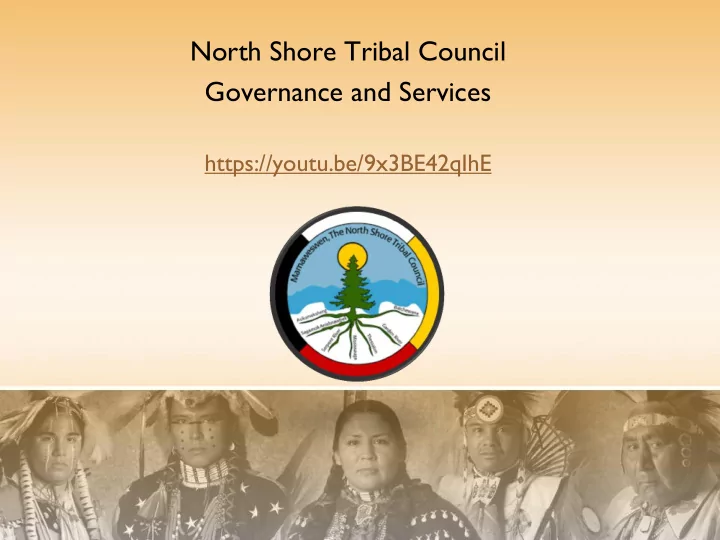

North Shore Tribal Council Governance and Services https://youtu.be/9x3BE42qIhE
MAMAWESWEN, NORTH SHORE TRIBAL COUNCIL • Working collaboratively together for 30 years • Collectively developed service processes that work for member communities • Built sustainable relationships across our traditional territories and communities.
North Shore Tribal Council GOVERNANCE SYSTEMS
MAMAWESWEN, NORTH SHORE TRIBAL COUNCIL GOVERNANCE STRUCTURE AND ORGANIZATIONAL CHART
Mamaweswen, North Shore Tribal Council (www.mamaweswen.ca)
MAAMWESYING COMMUNITY HEALTH SERVICES GOVERNANCE STRUCTURE AND ORGANIZATIONAL CHART
Maamwesying Community Health Service
BENBOWOPKA TREATMENT CENTRE GOVERNANCE STRUCTURE AND ORGANIZATIONAL CHART
Benbowopka Treatment Centre (www.benbowopka.com/)
NOGDAWINDAMIN FAMILY & COMMUNITY SERVICES GOVERNANCE STRUCTURE AND ORGANIZATIONAL CHART
NOGDAWINDAMIN, FAMILY AND COMMUNITY SERVICES (www.nog.ca)
THE BEGINNING • Mamaweswen, the North Shore Tribal Council (NSTC) Board of Directors passed a Tribal Council Resolution directing the secretariat to address the growing epidemic of prescription and illicit drug use among the members of the NSTC First Nations. The residential school, colonialism, jurisdictional and social circumstances contribute to prescription and illicit drug abuse and affects the ability to effectively respond. • This resulted in a multi-partner regional effort to facilitate integration of services and improve the continuum of care for community-based treatment and recovery from addictions to prescription and illicit drug use.
PRINCIPLES • The shared values, principles and vision reflected herein have been developed through training and collaborative discussions regarding the Science of Addiction, Governance and Risk Management, Value Based Partnerships and Evaluation: • Build on existing capacities; • Identify and apply Best Practices; • Ensure alignment where possible with existing strategies and program and service delivery requirements; • Achieve functional and practical coordination and integration; • Identify and apply culturally appropriate and evidence based options; • Prioritize local control and delivery options; and • All partners will agree to be, aware of and abide by, the requirements of applicable Privacy Legislation.
MEMORANDUM OF UNDERSTANDING • ThE MOU describes a commitment and process for the parties to work towards a strategy and partnership for collaborative and coordinated service integration in Traditional Aboriginal Healing, mental health, addictions, primary care, provincial and federal services and between First Nations and non-First Nations entities to address prescription and illicit drug abuse. • The partnership will establish an interdisciplinary and inter- organizational continuum of care with wrap-around services that are respectful, wholistic, client/family centered and includes the seven grandfather teachings for people, particularly addicted to prescription and illicit drugs through a chronic disease approach to addiction.
HARM REDUCTION Practical Strategies and ideas aimed at reducing negative consequences associated with drug use. It is a movement for social justice built on a belief in and respect for the rights of people and opportunity for choices. • Imparting skill in self-care (and for others) • Lowering personal risk • Encouraging access to treatment • Supporting reintegration • Limiting the spread of disease • Improving environments • Cutting down on public expenses • Saving lives
CONTINUUM OF CARE Prevention Community based Primary and secondary Early Identification Community Outreach at risk population Intervention Counselling Services – Community and Tribal Level Pre-Treatment Withdrawal Services – Community and Tribal Level Treatment Preparation – Community and Tribal Level Treatment Residential Treatment – Benbowopka/Tribal Level Transition Case Management – Community Level Continuing Care Aftercare Programs/Land Based Programs Beauty From Ashes
PRE-TREATMENT Withdrawal Services – Community and Tribal Level • Intake and Assessment • Treatment Options Identified: • Medical/Traditional Medicine • Outpatient/residential Treatment Preparation – Community and Tribal Level • Referral to Benbowopka Treatment Centre or Other
Community Based Withdrawal Management • The overall goal of the project is to assist community members addicted to prescription medication and illicit drugs wean off their drug dependency by implementing comprehensive integrative community models of care and treatment for prescription drug abuse (PDA) within each of our seven member First Nations and project partners. This involves integration of community resources and all Tribal Council level resources. The interdisciplinary “community care teams” will be composed of traditional and western care providers which include medical professionals, mental health and addictions professionals, traditional wellness workers and other human resources deemed appropriate by the community. • Decrease the prescribing rates for opiates for pain management in the region. • Increase the referrals to alternative therapies for pain management. • Increase local capacity to provide addictions treatment services • Improve the continuum of care for addictions treatment and aftercare in First Nations
Benbowopka Treatment Centre • 28 day residential treatment program • 12 bed facility • Federally and Provincially Funded • Harm Reduction • Concurrent Disorders • Suboxone and Methadone • Trauma Informed Care • Indigenous Healing Seeking Safety • Dr. Teresa Marsh • Catalyst Grant approved by the Canadian Institute of Health Research
RESIDENTIAL PROGRAM • CULTURALLY BASED • Sacred Bundle and drum is present • Daily Prayer and Smudge • Sacred Fire • Sweat Lodge • Pipe Ceremony • Hand Drum Making • Rattle Making Client leaves the program with their own personal bundle
TRAUMA INFORMED CARE • Traums is often the root cause behind many public health and social issues and poses the premise that everyone has a right to a future that is not dictated by the past. • Principles of Trauma Informed Care: • Safety • Choice • Collaboration • Trustworthiness • Connection • Strength based perspective
SEEKING SAFETY • The Seeking Safety approach is aimed at addressing the effects of trauma and substance abuse by increasing the coping skills of clients. • Seeking Safety’s psycho -educational model focuses on teaching new and healthier coping skills to replace unhealthy behavior patterns. • The program emphasizes values of respect, care, integration, and healing of self, similar to the Seven Grandfather Teachings. • Research/Training/Mentoring/Care for the Care Giver and clinical lead is Dr. Teresa Naseba Marsh who combined Aboriginal traditional healing practices with Seeking Safety to create a model specifically for addressing the needs of Aboriginal people who are struggling with trauma and addictions.
MEEGWETCH
Recommend
More recommend